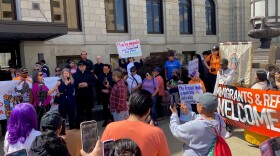The state of Iowa argued before a federal appeals court Thursday that the state should be allowed to enforce its immigration law making illegal reentry a state crime.
A federal judge temporarily blocked the law’s enforcement after the U.S. Department of Justice and immigrant rights groups filed two separate legal challenges.
U.S. District Judge Stephen Locher wrote in June the law is unconstitutional and conflicts with U.S. immigration laws. Iowa Attorney General Brenna Bird appealed his decision.
Iowa Solicitor General Eric Wessan said Thursday there is an immigration crisis affecting the country and Iowa, and the Iowa Legislature responded by passing the illegal reentry law. He said the state should be given a chance to enforce the law, and that the state would enforce it in a way that does not conflict with federal law.
“Just because the state and federal government legislate in a way that overlaps…that doesn’t necessarily mean conflict,” Wessan said.
If the appeals court lifts the injunction, state and local law enforcement would be able to arrest and charge immigrants with the crime of illegal reentry if they were previously deported or denied entry to the country and returned without permission. State judges could order them to leave the U.S.
To allow this law to go into effect would be to permit other states to enact the same laws. And then you would end up with a patchwork of 50 different immigration systems.Emma Winger, American Immigration Council Deputy Legal Director
American Immigration Council Deputy Legal Director Emma Winger said there is no way the law can be enforced without violating the Constitution. She said some immigrants with permanent legal status could be prosecuted under Iowa’s law.
“There’s nothing that truly protects our clients from arrest, prosecution, imprisonment and then orders to leave the country, other than a federal court order,” Winger said at a news conference after the hearing. “And that’s, of course, what we’re asking for.”
Lawyers for the state have said people with legal status would not be arrested.
The state has argued Iowa’s law just allows state officials to enforce existing federal law and that it doesn’t create new standards.
Leif Overvold with the DOJ said the federal government has exclusive power to regulate immigration.
“We think the district court properly issued an injunction that preserves the status quo that has existed in this area for more than a century,” he said.
The three-judge panel of the U.S. Eighth Circuit Court of Appeals could take several months to decide if Iowa’s illegal reentry law can be enforced.
Winger said it’s likely the U.S. Supreme Court will eventually consider the issue of whether states can enforce these types of laws, but she said it may be another state’s similar immigration law that gets heard at the highest level.
“To allow this law to go into effect would be to permit other states to enact the same laws,” she said. “And then you would end up with a patchwork of 50 different immigration systems, which is totally unworkable.”
Texas was the first state to pass a law criminalizing illegal entry and reentry, Iowa essentially copied the reentry provision, and Oklahoma also passed an immigration law. The Texas law is being considered by a different federal appeals court. An injunction on the Oklahoma law has been appealed to a federal appeals court.






